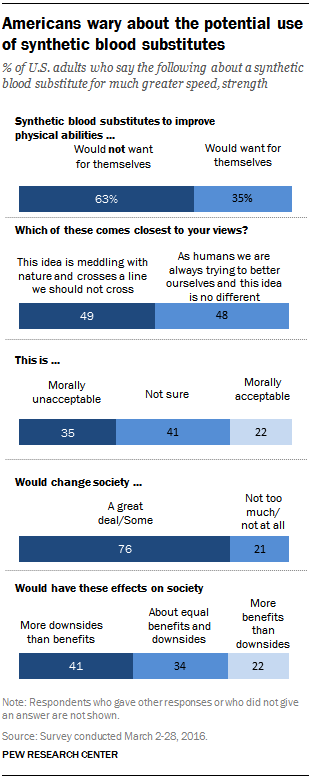Americans are largely cautious about the idea of using synthetic blood substitutes to improve the speed, strength and stamina of healthy individuals, according to a recent Pew Research Center report examining U.S. attitudes about the potential use of emerging biomedical technologies.
Lab-manufactured synthetic blood, sometimes called “super blood,” would replicate the oxygen-carrying capabilities of red blood cells, thereby boosting oxygen levels in the bloodstream. At its most basic application, synthetic blood could help alleviate blood shortages, given that it could be used regardless of blood type. But it could also be engineered to fight infections or carry more oxygen, potentially boosting healthy individuals’ productivity in their everyday lives.
For the biomedical world, synthetic blood is a not a new concept. Research into substitutes for human blood ramped up in the 1980s due to the HIV crisis. More recently, a group of researchers from the UK announced that clinical trials to give human subjects manufactured blood in transfusions could begin as early as 2017.
But the Center’s survey found that Americans are more worried than excited or enthusiastic about the potential for healthy people to use synthetic blood (63% vs. 36%). And a majority of Americans – roughly six-in-ten – said they would not want synthetic blood substitutes in their own body to improve their abilities, while 35% would be open to it.

One reason for the caution: The public is closely split on whether the idea of synthetic blood is meddling with nature, or whether it is no different than other ways that humans try to better themselves (49% vs. 48%).
While most Americans say the use of synthetic blood to give healthy individuals much greater physical prowess would bring at least some change to society, people are less certain that using synthetic blood in this way would be morally acceptable.
Some 35% of Americans view the potential use of synthetic blood in healthy people as morally unacceptable, while about a fifth (22%) say it would be morally acceptable and 41% are not sure. People with moral reservations about using synthetic blood in this way often described this idea as “disrupting nature” or “playing God.” One survey respondent stated:
“It’s crossing a line that humans should not cross. Just because science helps us to do things doesn’t mean we should.”
There are some notable religious differences in public views about the morality of healthy people using synthetic blood. Highly religious Americans (43%) are more likely than those with a low level of religious commitment (18%) to say this type of enhancement is morally unacceptable. And majorities of all major Christian groups say they would not want synthetic blood for themselves. A higher share of atheists and agnostics, however, are open to having this enhancement (54% and 45% respectively).
This sentiment echoes ideas expressed in focus groups conducted by the Center. A man from Atlanta said:
[synthetic blood]
Other focus group participants likened synthetic blood to what they considered unethical steroid use and doping in sports, and they worried that wider use of synthetic blood might give some people substantial physical advantages over their peers. Others went further, saying they worried these enhancements might result in the creation of “superhumans” who could impose their will onto others, thereby creating more divisions in society.
Americans who say using synthetic blood to enhance the physical abilities of healthy people would be morally acceptable tend to see this idea as a continuation of our efforts to improve ourselves. One survey respondent put it this way: “Biomedical advances are the next logical step in human progress.”
Most Americans (70%) say the use of synthetic blood substitutes to give healthy people much-improved physical abilities would increase inequality in society. However, some in our focus groups pointed out that this would be no different from other aspects of our society. As one man from Phoenix put it:
[changing the]
